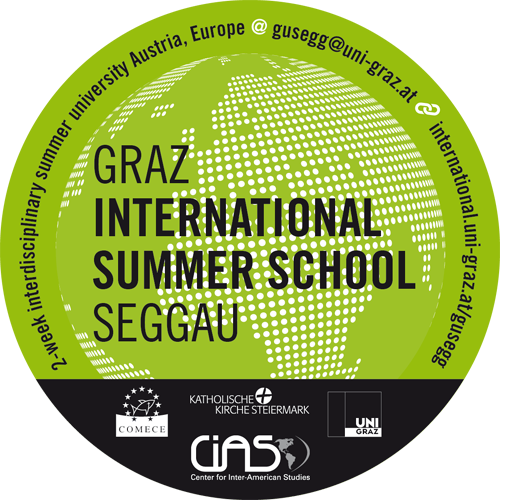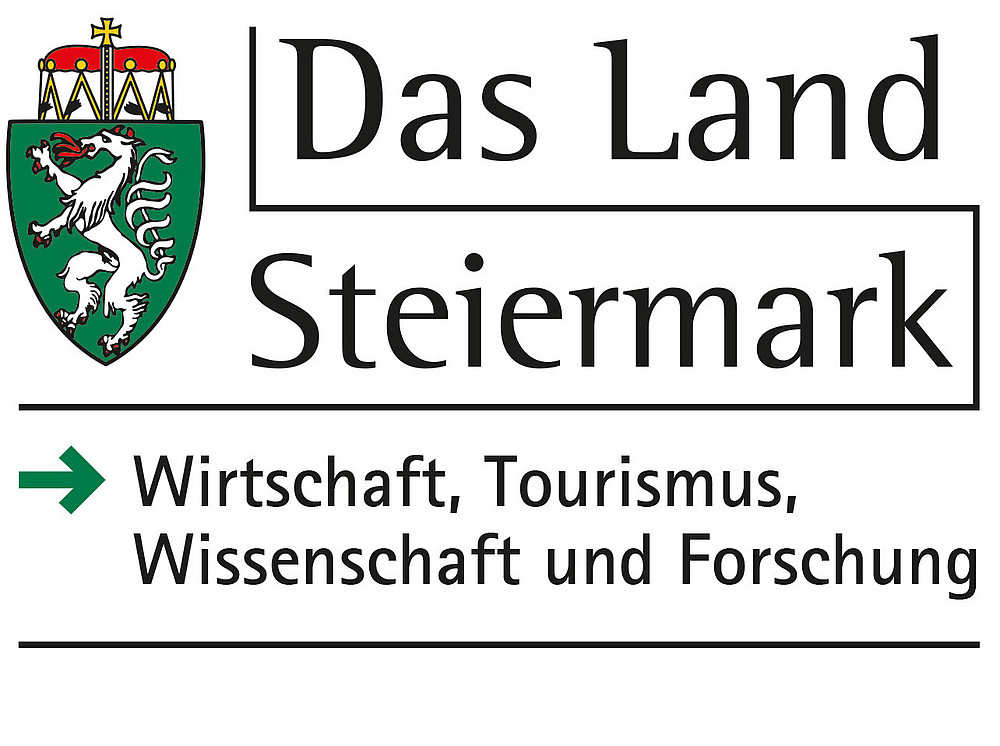Graz International Summer School Seggau
The Graz International Summer School Seggau is designed for internationally oriented, highly motivated students from all disciplines, who wish to deepen their understanding of current European and international affairs by studying and discussing global developments and challenges within the context of transformation processes and demographic change reflecting aspects of individual, social, political, religious, cultural, literary, regional, economic, cohort and national identities.
The privacy policy can be found here.

Contact persons GUSEGG Summer School
Mag. (FH) Ulrike Grassberger
Dott.ssa Chiara Ricci
Strassoldogasse 10/EG
Phone:+43 316 380 - 3926
E-Mail:gusegg(at)uni-graz.at
Consultations by appointment
Seven good reasons to apply
- 2-week summer university with a unique campus atmosphere at Seggau Castle
- 6 ECTS credits (for participation in the program, as well as writing a seminar paper)
- Lectures, panel discussions and 7 parallel seminar modules (small groups)
- Discussions and networking opportunities with international lecturers and guests
- All-inclusive package (tuition, meals, accommodation, extra-curricular program)
- Developing skills in public speaking, academic writing, creative writing, and critical thinking
- Publishing opportunity in the Off Campus: Seggau School of Thought publication series
General information
Target Group
The Graz International Summer School Seggau is designed for internationally oriented, highly motivated students from all disciplines, who wish to deepen their understanding of current European and international affairs by studying and discussing global developments and challenges within the context of transformation processes and demographic change reflecting aspects of individual, social, political, religious, cultural, literary, regional, economic, cohort and national identities.
Project Organization
The University of Graz organizes the summer school in cooperation with the Commission of the Bishops' Conferences of the European Community (COMECE) and the Diocese Graz-Seckau. The Office of International Relations of the University of Graz acts as the coordinating unit. Prof. Roberta Maierhofer (Center for Inter-American Studies) is the academic director.
- Summer School Academic Director: Roberta Maierhofer, Center for Inter-American Studies
- Summer School Academic Co-Director: Michael Kuhn
- Representative of the Diocese Graz-Seckau: Florian Traussnig
- Contact at the University of Graz: Ulrike Grassberger and Chiara Ricci (teachers and students)
Aims and Objectives
- Interdisciplinary co-operation of teachers and students on the cultural, intellectual and historical dimensions of current European and International affairs in view of their positioning in a globalized world.
- Presentation in research and teaching of focus areas of the University of Graz – South Eastern Europe and North, Central and South America.
- Development and education of young leaders of tomorrow in the fields of politics, administration, business, science, culture and religion.
Venue: Seggau Castle (Austria)
The venue of the summer school is Seggau Castle located 40 km south of Graz, Austria.
Academic Program
Theme/Principle 2024
Disruptive Imagination and Resistance in Europe and the Americas: State - Society - Religion
How the summer school works
Students will deal with the relevance and effect on global affairs of Europe/EU (emphasis on Southeastern Europe) and beyond by attending the offered morning and evening lectures, panel discussions, and participating in one of the following Seminar modules in the afternoon:
- Seminar 1 - Contested Territories
- Seminar 2 - Media & Society: Democracy in a Post-Digital Age
- Seminar 3 - Challenges of Economy
- Seminar 4 - Jewish Studies
- Seminar 5 - Culture, Gender, and Narrative Pedagogies
- Seminar 6 - Aging in Data
- Seminar 7 - Society, politics and emotions
Click here for more information about the seminars.
Certificates / ECTS
Participants will receive a certificate of participation at the end of the summer school. Please note that this only confirms the participation and cannot be used for credit transfer.
Students who wish to receive 6 ECTS credits are required to participate in the full program AND to write a seminar paper. Instructions about writing a seminar paper and more information about the credits, will be distributed throughout the course of the summer school. Once students have received a positive grade, transcripts will be available. These transcripts can be used to obtain credit at the home institution.
Venue Seggau Castle
Seggau Castle is located about 40 km south of Graz and is situated on a hill above the town of Leibnitz, amidst the vineyards of southern Styria, Austria. Its history dates back to Roman times, and the unique lapidarium in Seggau is evidence of this period.
The Upper Castle was built in the 12th century by Archbishop Konrad of Salzburg as an administrative and missionary bastion. The Old Tower was given to the first bishop of the newly founded diocese of Seckau (hence the name) as his residence. Seggau Castle served as the seat of the Styrian diocese until the late 18th century and remained a summer residence well into the 20th century.
The architecture is still impressive. The Old Tower was raised twice and finally converted into a clock tower in 1606. Among other things, numerous ancient stones (from the 2nd century BC) from the cemeteries of the Roman municipality of Flavia Solva were used as building materials. In 1815, the 800-year-old tower had to be dismantled due to severe damage caused by the heavy bells. In the upper floors of the tower, about 500 marble inscriptions and relief stones from Roman times were found, most of which are legible. The most beautiful stones were used for a new façade of the upper castle, which was built in 1830/1832 (the model was the Vatican's Lapidarium).
The Seggau Lapidarium is one of the castle's main visitor attractions, as are the "Prince's Rooms" with their fully preserved Baroque furnishings, the chapel, the huge historic bell "Liesl" and the world-famous 300-year-old wine cellar, where wine tastings are held regularly.
Stay at the castle
The fee covers course costs, tuition, room & board (double or triple rooms, 3 meals per day) for the entire 2 weeks. If you prefer to stay in a single room, please let us know and we will inform you about the surcharge. This means we will be arranging your stay at the Hotel Schloss Seggau as well as organizing the shuttle from Leibnitz train station to Seggau with a shuttle company.
Travel information
The venue is easy to reach and there are many ways to get to Seggau.
Please plan your arrival so that you arrive before 6pm on June 30 and depart on July 13, 2024 (last shuttle at 12pm).
Arrival by train
Please find out how to get to Vienna or Graz from your respective country! For Austrian train schedules use: Österreichische Bundesbahnen (ÖBB) Routenplaner.
Arrival by car
Hotel Schloss Seggau, Seggauberg 1
8430 Leibnitz, Austria
www.seggau.com/en/contact/
Shuttle Service from Leibnitz
The summer school team organizes a shuttle service (cab) for the summer school students from Leibnitz train station to Seggau Castle, depending on the arrival time. To use this shuttle service, please contact us at least two weeks in advance so that we can plan your arrival and organize vehicles and drivers. If you have reserved the shuttle, arrive and there is no shuttle available, please wait a few minutes as there is only a limited number of vehicles available.
Board, Committee and Members
Honorary Board Bishop Wilhelm Krautwaschl - Diocese of Graz-Seckau (A)
Scientific Advisory Board Roberta Maierhofer University of Graz (A) Michael Kuhn Mirko Petrić Institute of Social Sciences Ivo Pilar (HR) Manfred Prisching University of Graz (A) Luis San Vicente Portes Montclair State University (USA)
Affiliated students
Amy Anne Kennedy Academy of Dance, Maribor Diana Maftei "Alexandru Ioan Cuza" University of Iasi, Faculty of Letters, English Department Desanka Nedovic University of Novi Sad, Philosophical Faculty Marko Slocer University of Novi Sad, Department of Economics
| Steering Committee University of Graz: Ao.Univ.-Prof. M.A. Mag. Dr. Roberta Maierhofer Center for Inter-American Studies roberta.maierhofer(at)uni-graz.at
Nicole Haring, BA MA Center for Inter-American Studies
Mag.rer.nat. Bakk.rer.nat. Florian Ortner Office of the Rector
Mag. (FH) Ulrike Grassberger Office for International Relations Dr.ssa Chiara Ricci Office for International Relations
Comece: Drs. Michael Kuhn B-1050 Brussels - Belgium Diocese of Graz- Seckau: Walter Prügger BEd M.A. A-8010 Graz, Bischofplatz 4 walter.pruegger(at)graz-seckau.at
Dr. Florian Traussnig A-8010 Graz, Leechgasse 24
|
Application
Call open for GUSEGG 2024.
The application deadline is February 25, 2024.
If you would like to apply for the Graz International Summer School Seggau 2024: "Disruptive Imagination and Resistance in Europe and the Americas: State - Society - Religion", please follow the instructions step by step:
Please apply via this link and send us the required documents via email. Please create a PDF with all documentation.
Please note: Students who wish to apply for the Graz International Summer School Seggau 2024 must submit the documents in English or German. Diplomas and certificates in a language other than German or English must be submitted with a translation certified by the home university.
Application deadline - February 25, 2024
Applications must be received by February 25, 2024. Make sure that your application arrives on time. Applications received after this deadline will not be considered!
Commitment
Students will be informed about the selection in March 2024.
We will inform you directly by email - therefore please indicate your correct email address in the application form.
Fees / Scholarships
The total student participation fee is 2.400€ and 650€ for student participants of the University of Graz. It covers course costs, tuition, room & board (double or triple rooms, 3 meals per day) for the entire 2 weeks. It is possible to stay in a single room for a surcharge.
Even though you might not have the financial means to participate, do not hesitate to apply! Funding and scholarships will be available!
David-Herzog-Fonds Scholarships
The David-Herzog-Fonds has generously agreed to fund seven students to participate in the seminar module Jewish Studies (SM04). The scholarships cover 600€ of the participation costs (of 2.400€ ) and a maximum of 850€ travel costs (after submission of the travel invoice). More information on the requirements and the application form can be found here
CEEPUS and CEEPUS Freemover Scholarships are available:
CEEPUS and CEEPUS Freemover scholarships are available.
Current CEEPUS member countries: Albania, Austria, Bosnia and Herzegovina, Bulgaria, Croatia, the Czech Republic, Hungary, North Macedonia, Moldova, Montenegro, Poland, Romania, Serbia, the Slovak Republic and Slovenia.
If you are studying in one of theses countries, you might be eligible for a CEEPUS or CEEPUS freemover scholarship. Please contact us for more information.
Cancellation policy
80% of your tuition fee will be refunded in case of:
- Illness (you must provide a medical report),
- Severe illness or death of a close relative (i.e. parents, siblings, spouse/partner, children; you must provide a medical report).
Payment
fter the selection process, accepted students will receive further information regarding payment (bank account number etc.) via email. Bank transactions have to be completed by March 11, 2024.
Please keep in mind that in case of international money transfers banks may charge service fees which have to be covered in full by the students. The University of Graz will not assume any charges for students’ money transfers and the summer school fee has to be received in full.
Travel arrangements
All students are responsible for their own travel arrangements. You can either travel directly to Seggau by car, or to the Leibnitz train station (close to Seggau Castle). Shuttles will be provided to the summer school venue on arrival and departure day. Students must arrive before 6 pm on the arrival day.
Visa
Who needs a visa?
To find out whether you will need to apply for a Schengen visa in order to enter into Austria, please contact the Austrian embassy or consulate in your country for up-to-date information. You may find all embassies and consulates listed under the following link:
Search for Austrian Representations - BMEIA, Ministry of Foreign Affairs Austria.
